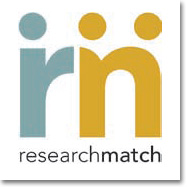Partnership enables easy pairing of researchers, volunteers
CU's membership in ResearchMatch pays dividends in medical studies
By Cynthia Pasquale
 Volunteers are at the heart of medical studies; without them, science moves forward slowly. But until now, finding interested volunteers to participate in ethical research studies has been a labored process, causing expensive delays. Volunteers are at the heart of medical studies; without them, science moves forward slowly. But until now, finding interested volunteers to participate in ethical research studies has been a labored process, causing expensive delays.
In an effort to effectively unite those interested in joining research studies with investigators, the University of Colorado has joined ResearchMatch, a national partnership that offers a secure Web-based recruitment registry.
The Colorado Clinical and Translational Sciences Institute (CCTSI) at CU Denver is one of more than 50 institutions across the nation that has partnered with ResearchMatch, hosted by Vanderbilt University and launched in November 2009. CU joined the network last August.
"Many people who have an illness or disease are interested in helping not only themselves but other people," said Ronald Sokol, M.D., director of CCTSI. "Quite frankly, the only way we really make progress in medical research is to eventually study new treatments in people who are affected by the disease. That's the only way to bring new treatments forward. There are many people willing to participate in a research study but they have no idea how to find out about it. This is a way for them to find out."
Previously, researchers had to find volunteers through a combination of advertisements – including "papers stuck up all over campus on bulletin boards," Sokol said – or by recruiting their own patients or those of primary care physicians, or members of support groups.
But these efforts have been inefficient, not only at CU, but at research institutions across the nation.
Sokol said the database needs "thousands of volunteers to be robust."
For example, he said, if a new drug is being tested, a researcher might need hundreds of volunteers. If the researcher is slow to recruit enough people, the study is delayed and becomes more difficult to conduct, and the expense of the study increases exponentially. That could cause delays in getting a new, potential life-saving drug on the market.
National Institutes of Health "data indicates that 85 percent of trials don't finish on time due to low patient participation, and 30 percent of trial sites fail to enroll even a single patient," said Gordon Bernard, a principal investigator with the Vanderbilt Clinical and Translational Science Awards.
With ResearchMatch, volunteers have a secure and convenient way to enroll; online registration takes less than 10 minutes. Health, medication and basic demographic information is requested, along with a person's home ZIP code. When a researcher finds a potential match, ResearchMatch sends an e-mail explaining the study to that person, who then may approve or deny contact with the researcher. Volunteers can withdraw at any point in the process.
"We're looking for everybody and anybody. They can be completely healthy or have any medical or other condition," Sokol said. "They can be any age – parents can register their children – and it's completely confidential. Private information is kept very, very secure."
Research studies run the gamut from medical or psychological issues to examining new treatments, drugs or even devices. Some studies, Sokol said, only require an online survey, while others require volunteers to be monitored over several months.
To find out more information about ResearchMatch, visit the program website at cctsi.ucdenver.edu or contact Alexis Thurlow, CCTSI ResearchMatch Liaison, at alexis.thurlow@ucdenver.edu or 970-310-1705. To register, visit cctsi.ucdenver.edu/researchmatch.

|